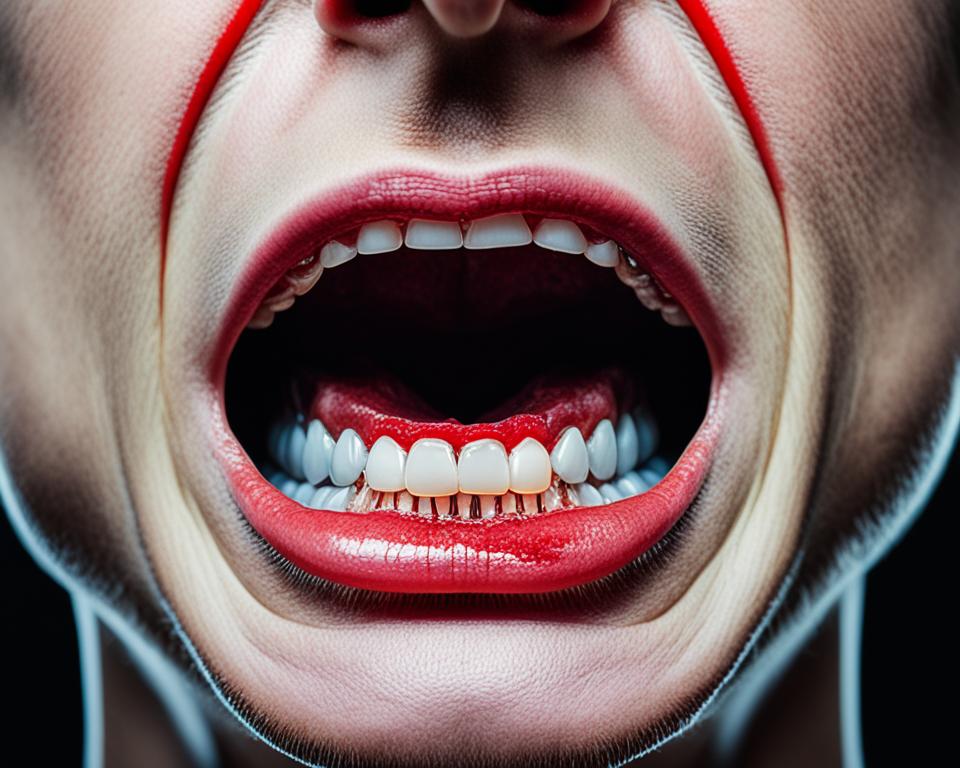Did you know that dental issues can cause pain not only in your teeth but also in your ears? It may come as a surprise, but the connection between tooth pain and ear pain is more common than you might think. When a person experiences a toothache, the pain can radiate to other areas, including the ears, due to the involvement of the trigeminal nerve.
The trigeminal nerve is responsible for transmitting sensations from the face, head, and oral cavity to the brain. Dental problems such as decay, infection, or injury can activate this nerve, leading to referred pain that is felt in areas other than the source. This means that if you have a toothache, you may also experience ear pain on the same side of your face.
In this article, we will explore the relationship between tooth pain and ear pain, the causes, symptoms, and treatment options. Whether you are dealing with dental issues or earaches, understanding the connection between the two can help you find relief and seek appropriate care.
The Connection Between Tooth Pain and Ear Pain
When it comes to tooth pain, many people may not realize that it can be connected to ear pain as well. The close proximity between the teeth and ears, along with the connection of the trigeminal nerve, can cause tooth pain to be felt as ear pain. This means that dental problems like dental decay, infection, and injury can lead to toothaches that radiate and cause discomfort in the ears.
In some cases, a severe dental issue like an abscessed tooth can even spread the infection to the surrounding teeth and ears, resulting in severe pain and potentially life-threatening complications. This highlights the importance of addressing dental problems promptly to prevent them from causing ear pain.
By maintaining good dental health and seeking regular dental check-ups, you can reduce the chances of experiencing tooth pain and its associated ear pain. Proper oral hygiene practices, such as brushing and flossing regularly, are vital in preventing dental problems that could lead to ear pain. Additionally, addressing dental issues promptly and seeking appropriate treatment can help ease any discomfort in both the teeth and ears.
Dental health and ear pain are interconnected, and it is crucial to prioritize your dental well-being to prevent any related complications. If you experience persistent tooth pain or ear pain, it is recommended to consult with a dentist or healthcare professional for a proper diagnosis and treatment plan.
Understanding Toothaches and Earaches
Toothaches can be a source of immense discomfort, often accompanied by pain and sensitivity. But did you know that toothaches can also cause ear pain? Understanding the connection between toothaches and earaches is crucial for effective diagnosis and treatment.
A toothache typically manifests as pain inside or around the affected tooth. This pain can range from a dull ache to a sharp, throbbing sensation. In addition to pain, toothaches may also cause sensitivity to hot or cold food and beverages, making it uncomfortable to consume certain items. Swollen glands in the neck or jaw may also be a sign of a toothache.
On the other hand, earaches can cause pain in or around the ear. This pain may be constant or intermittent, and it can range from mild to severe. Earaches can also result in difficulty sleeping and trouble with balance, affecting one’s overall quality of life.
It is important to differentiate between toothaches and earaches to determine the underlying cause of the pain. While both conditions can be distressing, the treatments may vary depending on the source of the discomfort.
Toothaches can be caused by a variety of dental conditions, such as:
- Cavities: Tooth decay can lead to the formation of cavities, which can cause toothaches.
- Abscesses: An abscessed tooth, which occurs when bacteria infect the root of the tooth, can result in severe tooth pain and potentially spread to the ears.
- Dental restorations: Previous dental work, such as fillings or crowns, can sometimes lead to toothaches.
By addressing these dental conditions, the ear pain caused by toothaches can be alleviated. Seeking timely dental treatment and addressing any underlying dental issues is crucial for managing toothaches and preventing them from impacting other areas, such as the ears.
Dental Conditions Causing Ear Pain:
| Dental Condition | Symptoms |
|---|---|
| Cavities | Tooth pain, sensitivity to hot or cold, swollen glands |
| Abscessed Tooth | Severe toothache, pain radiating to the ear, possible infection symptoms |
| Dental Restorations | Tooth sensitivity, discomfort around the restored tooth |
By understanding the intricacies of toothaches and earaches, individuals can seek appropriate treatment and find relief from their discomfort. If you are experiencing toothaches accompanied by ear pain, it is recommended to consult with a dentist for a comprehensive evaluation and tailored treatment plan.
Causes of Toothache and Ear Pain on the Same Side
Dental issues and sinus infections can both cause toothache and ear pain on the same side of the face. Understanding these underlying causes is crucial for determining the appropriate treatment and finding relief.
Dental Issues Causing Ear Pain
Dental problems such as tooth infections, cavities, or abscesses can lead to toothache and ear pain on the same side. When a tooth becomes infected or decayed, the surrounding tissues can become inflamed, resulting in pain that radiates to the ear. Additionally, dental issues can put pressure on the nearby nerves, leading to referred pain in the ear.
Sinus Infections Causing Tooth and Ear Pain
Sinus infections, also known as sinusitis, can cause toothache and ear pain due to the close proximity of the sinuses to the teeth and ears. Inflammation and pressure in the sinuses can transmit pain signals to the teeth and ears, causing discomfort on the same side of the face. It is not uncommon for individuals with sinusitis to experience toothache and ear pain simultaneously.
Other Causes of Toothache and Ear Pain
In addition to dental issues and sinus infections, several other factors can contribute to toothache and ear pain on the same side. These include:
- Temporomandibular joint (TMJ) disorders: Dysfunction in the TMJ can cause pain in the jaw joint, teeth, and ears.
- Tooth grinding (bruxism): Excessive teeth grinding or clenching can lead to tooth sensitivity, pain, and ear discomfort.
- Jaw injuries: Trauma or injury to the jaw can result in toothache and ear pain, as well as difficulty in jaw movement.
Identifying the specific cause of toothache and ear pain is essential for appropriate diagnosis and treatment. It is recommended to consult with a dental or medical professional to determine the underlying issue and develop a suitable treatment plan.
| Cause | Symptoms |
|---|---|
| Dental Issues | – Toothache – Swollen gums – Sensitivity to hot or cold – Inflammation |
| Sinus Infections | – Facial pressure – Congestion – Headache – Toothache – Earache |
| TMJ Disorders | – Jaw pain – Headaches – Clicking or popping noises in the jaw joint – Earache |
| Tooth Grinding | – Tooth sensitivity – Jaw pain – Headaches – Earache |
| Jaw Injuries | – Pain in the jaw joint – Toothache – Difficulty in jaw movement – Earache |
Symptoms of Toothache and Ear Pain
Recognizing the symptoms of toothache and ear pain is crucial for determining the source of the discomfort. Understanding the distinct signs can help differentiate between dental issues and ear-related problems.
Toothache Symptoms:
- Pain in and around the affected tooth
- Bad breath
- Inflammation of the gums
- Sensitivity to hot or cold temperatures
These symptoms often indicate dental problems such as decay, infections, or dental restorations. If you experience any of these signs, it is important to seek dental attention to alleviate the toothache and prevent further complications.
Earache Symptoms:
- Ear pain
- Trouble hearing
- Difficulty sleeping
- Jaw pain
These symptoms may indicate an underlying issue with the ear, such as an infection or inflammation. If you are experiencing ear pain along with any of these symptoms, it is essential to consult with a healthcare professional for a proper diagnosis and appropriate treatment.
| Toothache Symptoms | Earache Symptoms |
|---|---|
| Pain in and around the affected tooth | Ear pain |
| Bad breath | Trouble hearing |
| Inflammation of the gums | Difficulty sleeping |
| Sensitivity to hot or cold temperatures | Jaw pain |
Treating Toothache and Ear Pain
When it comes to treating tooth pain and ear pain, the right approach depends on the underlying cause of the discomfort. Toothaches can be caused by various dental issues such as cavities, infections, or injuries. In some cases, dental interventions like fillings, root canals, or dental restorations may be necessary to alleviate the pain. A root canal procedure, in particular, can be highly effective in eliminating tooth pain caused by damaged or infected teeth.
On the other hand, ear pain is often associated with ear infections. If you’re experiencing ear pain along with other symptoms such as fluid drainage, difficulty hearing, or fever, it’s crucial to seek medical attention. Antibiotics are commonly prescribed to treat ear infections and reduce inflammation. Over-the-counter pain medications can also provide relief, but severe cases may require the insertion of ear tubes to facilitate drainage and promote healing.
In addition to medical treatments, there are some at-home remedies that can help alleviate tooth and ear pain. Rinsing the mouth with warm salt water can help soothe toothaches by reducing inflammation and reducing the buildup of harmful bacteria. Applying a warm or cold compress to the affected area can also provide temporary relief from pain and discomfort.
Remember, it’s important to consult with a dental professional or physician before attempting any treatments at home. They can provide a proper diagnosis and recommend the most suitable treatment options for your specific situation.
Dental Interventions for Tooth Pain
| Treatment | Description |
|---|---|
| Fillings | A common procedure where decayed portions of the tooth are removed and replaced with a dental filling material. |
| Root Canal | A procedure to remove infected or damaged pulp from the tooth’s root canal system, followed by cleaning, filling, and sealing the space. |
| Dental Restorations | Various options such as crowns, dental bridges, or dental implants that aim to restore the functionality and appearance of damaged or missing teeth. |
Properly treating tooth pain and ear pain requires identifying the root cause and seeking appropriate professional care. By addressing dental issues promptly and following medical advice, you can find relief from both tooth and ear pain. Remember, early intervention is key to preventing complications and promoting overall dental and ear health.
Conclusion
In conclusion, dental issues can indeed cause ear pain. The close connection between the teeth and ears through the trigeminal nerve can result in toothaches radiating to the ears. Dental problems such as decay, infections, or injuries can lead to toothaches that cause discomfort and pain in the ears.
It is crucial to address dental problems promptly to prevent them from causing ear pain. Seeking proper diagnosis and treatment from a dentist or physician is essential for relieving both tooth and ear pain. Prompt intervention can help prevent more serious complications and promote dental and ear health.
If you are experiencing severe or persistent tooth or ear pain, it is recommended to consult with a dental professional or doctor to determine the underlying cause and develop an appropriate treatment plan. Taking care of your dental health through regular check-ups, good oral hygiene practices, and timely treatment can contribute to overall ear and dental pain relief.
FAQ
Can tooth pain cause ear pain?
Yes, tooth pain can cause ear pain. The main nerve involved in tooth pain, the trigeminal nerve, can cause referred pain that radiates to other areas like the head, face, and ears.
What dental issues can cause ear pain?
Dental issues such as dental decay, infection, and injury can lead to toothaches that can radiate and cause pain in the ears.
How can I differentiate between toothache and earache?
Toothaches manifest as pain inside or around the tooth, sensitivity to hot or cold food/beverages, and swollen glands. Earaches cause pain in or around the ear, difficulty sleeping, and trouble balancing.
What causes toothache and ear pain on the same side?
Tooth and ear pain on the same side can be caused by dental infections, cavities, abscesses, sinus infections, temporomandibular joint (TMJ) disorders, tooth grinding, and jaw injuries.
What are the symptoms of toothache and ear pain?
Symptoms of toothaches include pain in and around the tooth, bad breath, inflammation of the gums, and sensitivity to hot or cold. Earache symptoms include ear pain, trouble hearing, difficulty sleeping, and jaw pain.
How are toothache and ear pain treated?
Treatment for tooth pain may include dental interventions such as fillings, root canals, or dental restorations. Ear infections typically require antibiotics and pain medications. At-home remedies include rinsing with salt water and applying warm or cold compresses.
Can dental issues cause ear pain?
Yes, dental issues like tooth decay, infection, and injury can lead to toothaches that can radiate and cause pain in the ears.
What should I do if I have severe or persistent tooth or ear pain?
If you have severe or persistent tooth or ear pain, it is recommended to consult with a dentist or physician for a proper diagnosis and treatment plan.









